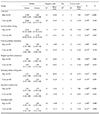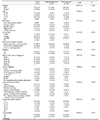1. Oh CM, Won YJ, Jung KW, Kong HJ, Cho H, Lee JK, et al. Cancer statistics in Korea: incidence, mortality, survival, and prevalence in 2013. Cancer Res Treat. 2016; 48(2):436–450.

2. Kolva E, Rosenfeld B, Pessin H, Breitbart W, Brescia R. Anxiety in terminally ill cancer patients. J Pain Symptom Manage. 2011; 42(5):691–701.

3. Derogatis LR, Morrow GR, Fetting J, Penman D, Piasetsky S, Schmale AM, et al. The prevalence of psychiatric disorders among cancer patients. JAMA. 1983; 249(6):751–757.

4. de Jonge P, Ormel J, Slaets JP, Kempen GI, Ranchor AV, van Jaarsveld CH, et al. Depressive symptoms in elderly patients predict poor adjustment after somatic events. Am J Geriatr Psychiatry. 2004; 12(1):57–64.
5. Cho J, Choi EK, Kim SY, Shin DW, Cho BL, Kim CH, et al. Association between cancer stigma and depression among cancer survivors: a nationwide survey in Korea. Psychooncology. 2013; 22(10):2372–2378.

6. Yang YL, Liu L, Wang Y, Wu H, Yang XS, Wang JN, et al. The prevalence of depression and anxiety among Chinese adults with cancer: a systematic review and meta-analysis. BMC Cancer. 2013; 13:393.

7. Jorm AF. History of depression as a risk factor for dementia: an updated review. Aust N Z J Psychiatry. 2001; 35(6):776–781.

8. Ell K, Xie B, Wells A, Nedjat-Haiem F, Lee PJ, Vourlekis B. Economic stress among low-income women with cancer: effects on quality of life. Cancer. 2008; 112(3):616–625.
9. Lim YO, Yoon HS, Nam IS, Kim YJ, Lee HJ, Choi KW. Stress process of older cancer patient's depression undergoing Chemotherapy: focus on spirituality, optimism, and family support. J Korean Gerontol Soc. 2014; 34(4):821–842.
10. Park KS, Choi ES. Problem-Solving Therapy: A Positive Approach to Clinical Intervention. Seoul: HAKJISA corp;2008. p. 139–143. .
11. Zhang AY, Cooper GS. Recognition of depression and anxiety among elderly colorectal cancer patients. Nurs Res Pract. 2010; 2010:693961.

12. Gellis ZD, Bruce ML. Problem solving therapy for subthreshold depression in home healthcare patients with cardiovascular disease. Am J Geriatr Psychiatry. 2010; 18(6):464–474.
13. Areán PA, Raue P, Mackin RS, Kanellopoulos D, McCulloch C, Alexopoulos GS. Problem-solving therapy and supportive therapy in older adults with major depression and executive dysfunction. Am J Psychiatry. 2010; 167(11):1391–1398.

14. Nezu AM, Nezu CM, Houts PS, Friedman SH, Faddis S. Relevance of problem-solving therapy to psychosocial oncology. J Psychosoc Oncol. 1999; 16(3-4):5–26.

15. Nezu AM, Nezu CM, Felgoise SH, McClure KS, Houts PS. Project Genesis: assessing the efficacy of problem-solving therapy for distressed adult cancer patients. J Consult Clin Psychol. 2003; 71(6):1036–1048.

16. Hopko DR, Armento ME, Robertson SM, Ryba MM, Carvalho JP, Colman LK, et al. Brief behavioral activation and problem-solving therapy for depressed breast cancer patients: randomized trial. J Consult Clin Psychol. 2011; 79(6):834–849.

17. Fann JR, Fan MY, Unützer J. Improving primary care for older
adults with cancer and depression. J Gen Intern Med. 2009; 24:Suppl 2. S417–S424.
18. Malouff JM, Thorsteinsson EB, Schutte NS. The efficacy of problem solving therapy in reducing mental and physical health problems: a meta-analysis. Clin Psychol Rev. 2007; 27(1):46–57.

19. Bell AC, D'Zurilla TJ. Problem-solving therapy for depression: a meta-analysis. Clin Psychol Rev. 2009; 29(4):348–353.

20. Nezu AM, D'Zurilla TJ. Problem-solving therapy : a positive approach to clinical intervention. New York: Springer Publishing Company;2006.
22. Yoon HS, Koo BM, Lee K, Lee JY. The effectiveness of problem-solving treatment on geriatric depression. J Korean Gerontol Soc. 2010; 30(3):871–894.
23. Lee HK. Handbook of Positive psychology. Seoul: HAKJISA corp;2008.
24. Irwin M, Artin KH, Oxman MN. Screening for depression in the older adult: criterion validity of the 10-item center for epidemiological studies depression scale (CES-D). Arch Intern Med. 1999; 159(15):1701–1704.
25. Kim HS, Park SM, Jang SN, Kwon S. Depressive symptoms, chronic medical illness, and health care utilization: findings from the Korean Longitudinal Study of Ageing (KLoSA). Int Psychogeriatr. 2011; 23(8):1285–1293.

26. D'Zurilla TJ, Nezu AM, Maydeu-Olivares Cancer. Social problem-solving inventory Revised (SPSI-R): Technical manual. North Tonawanda: Multi-Health Systems;2002.
27. Kim SY. Statistical analysis based on experimental studies. In : Survey Research Spring Conference; June 9, 2007; Seoul National University. Seoul: The Korean Association for Survey Research;2007.
28. Baer RA. Mindfulness training as a clinical intervention: a conceptual and empirical review. CLIN PSYCHOL-SCI PR. 2003; 10(2):125–143.

29. Panza F, Frisardi V, Capurso C, D'Introno A, Colacicco AM, Imbimbo BP, et al. Late-life depression, mild cognitive impairment, and dementia: possible continuum? Am J Geriatr Psychiatry. 2010; 18(2):98–116.

30. Richard E, Reitz C, Honig LH, Schupf N, Tang MX, Manly JJ, et al. Late-life depression, mild cognitive impairment, and dementia. JAMA Neurol. 2013; 70(3):374–382.







 PDF
PDF ePub
ePub Citation
Citation Print
Print






 XML Download
XML Download